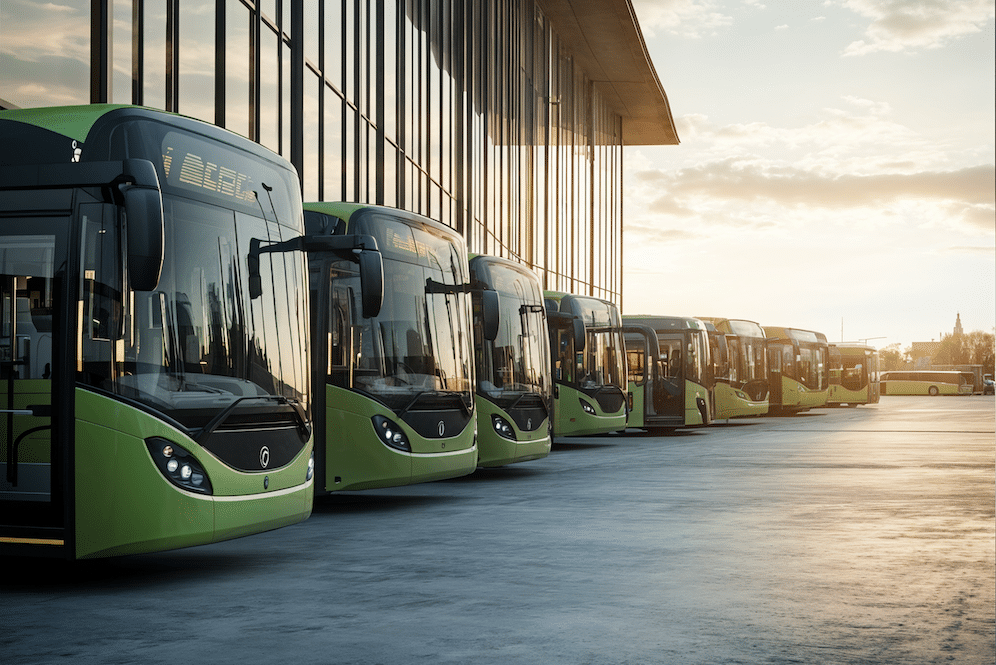Bus Franchising – How Will it Affect Electrification?
By David Philipson, Commercial Product Manager
Bus fanatics hop on board – no need for exact change! We’re taking a tour through the world of UK buses, electrification, and what happens when local authorities get the power they’ve been waiting for.
Legislation laid before Parliament last month grants new powers to all Local Transport Authorities in England, enabling them to take control of bus services in their areas.
So after close to 40 years of de-regulation, local councils have got the keys back to their own bus systems and are revving up for change in an electrifying way. (40 Years of hurt but Jules Remit still gleaming, as someone once said?)
The state of play: buses in the UK
For those of you that haven’t been keeping track of bus electrification statistics as a favourite pastime, here’s a quick roundup.
Currently, the UK has around 32,000 buses, and of those, close to 4,000 are already electric.
This is largely thanks to the efforts of schemes like the All Electric Bus Town, ZEBRA, and ScotZEB initiatives, all of which have helped to put the brakes on exhaust fumes while putting the pedal to the metal on decarbonisation.
Now, with powers extended to local transport authorities to allow bus franchising beyond London and the Mayoral Combined Authorities, it’s not just about the route numbers, it’s about routes to decarbonisation.
Picture this: more buses powered by clean electricity, fewer by diesel, and a whole lot less coughing in city centres.
The London model: proof franchising works
London’s bus system has been operating under a franchise model since the 1984 London Regional Transport Act, and is the poster child of bus reform – efficient, clean, and reliable.
The franchising approach allows Transport for London (TfL) to decide on routes, fares, and schedules, while private companies operate the buses – they do the actual driving. It’s a bit like letting someone else cook for you—you decide what’s on the menu, and they do the heavy lifting.
The success of franchising in London has been a key argument for extending these powers to regions outside the capital.
The model allows for better planning, more accountability, and—here’s the big one—quicker movement towards decarbonisation. When local transport authorities can control where and when buses run, they can prioritise electrification in a way that makes sense for their specific communities.
Imagine cleaner air in your neighbourhood, and all it takes is a bit of bureaucracy with a dash of local enthusiasm. You can almost smell the fresh air already.
Turbocharging electrification: economies of scale
So how do these extended powers help us fast-track electrification? For starters, local authorities are more incentivised to push for electric buses when they have a direct say in the network. They can take a long-term approach to planning rather than getting tangled in short-term economic motives.
A big plus for franchising is the economies of scale through standardised bus fleets across a region -buying in bulk works just as well for buses as it does for anything else.
When local authorities have the power to purchase large numbers of buses, they can bring down the cost per vehicle. This not only makes the transition to electric more financially viable but also speeds it up.
More buses for less money? That’s the kind of maths even the most financially cautious councillors can get behind.
It’s not just about the buses, either – charging infrastructure benefits from bulk planning too. Instead of individual operators figuring out where to put a few chargers, franchising allows for a cohesive, regional approach. Think fewer “charging oases” and more well-planned hubs where buses can power up quickly and efficiently.
Bus operators: frenemies in franchising
What about the bus operators? Under a franchise model, operators no longer have to gamble on whether a particular route will be profitable. They’re simply paid to run the services.
This stability can make long-term planning easier and less financially risky for the operators. And operators may prefer to focus on doing the job well, without having to worry about whether the commuter numbers on the 7:45am to Oldham are going to cover the operating costs.
On the downside, operators would lose some of the freedom that comes with a fully deregulated market – choosing what routes to run, and not being involved in a bidding war against competitors to run profitable routes.
Back in 1984, when Margaret Thatcher deregulated the bus market, the aim was to create competition. While this goal was achieved (competition was created) the overall effect in the 1980’s was not what was envisioned – higher fares, patchwork coverage, and decreased ridership. Though much of this has been rectified since the new millennium.
Franchising, while offering less commercial freedom to operators, promises consistency and a clearer path to decarbonisation.
It’s a transition from the “Wild West” to an ironically well-oiled machine – or at least that’s the ambition. And operators still get to be part of the ride, just with a more controlled itinerary.
A bright electric future for all
Ultimately, extending franchising powers across the UK could mean a more sustainable, coherent, and greener bus network. It’s about moving people efficiently while clearing the air.
With less competition for routes and more collaboration, regions can plan for a future where public transport is the easy, clean choice.
So if local transport authorities getting a little more power does enable bus operators to focus on running buses, and to all of us breathing less diesel fumes, that sounds like a plus.
By bringing back regulatory powers removed in the 1980’s, the new government has performed a 40-year U-turn. The full effects remain to be seen but we hope that accelerating a greener electrified future is one of them.
